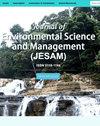Farmers’ Perception on the Sustainability of a Rubber- Based Agroforestry System as a Climate Change Adaptation Strategy in Agusan Del Sur and North Cotabato, Philippines
IF 0.3
4区 环境科学与生态学
Q4 ENVIRONMENTAL SCIENCES
引用次数: 0
Abstract
This documentation research sought to evaluate the effectiveness of rubber-based agroforestry typologies as a climate change adaptation strategy in the major rubber producing regions in the Philippines, particularly in Agusan del Sur and North Cotabato. It focused on the understanding/perception of the RBAS farmer respondents on climate change and their account of its influence on the production system and their coping mechanisms. Among the farmer respondents, drought (El Niño), typhoon, strong winds, heavy rains/excessive rainfall, flash floods and landslides are among the common evidences of climate change. Generally, most of the adaptation strategies employed is through cultural management practices like minimized usage of inorganic fertilizer and chemical pesticides from Agusan del Sur farmer respondents while some of the farmer respondents in North Cotabato employed organic farming practices to adapt to climate change. For both provinces, farmer respondents particularly identified agroforestry and diversified farming system as an effective adaptation strategy. Results proved the potential of the rubber-based agroforestry system to evolve as a resilient farming practice to adapt to climate change vis-à-vis stable biological and economic productivity, controlled occurrence of pest and diseases and minimized detrimental effects of climate change on the agroforestry farm component as a whole.菲律宾南阿古桑和哥打巴托北部农民对橡胶农林系统可持续性的认识
这项文献研究旨在评估以橡胶为基础的农林类型学作为菲律宾主要橡胶生产地区,特别是南阿古桑和北哥打巴托的气候变化适应战略的有效性。它侧重于澳大利亚储备银行农民受访者对气候变化的理解/看法,以及他们对气候变化对生产系统及其应对机制的影响的描述。在农民受访者中,干旱(厄尔尼诺)、台风、强风、暴雨/过多降雨、山洪暴发和山体滑坡是气候变化的常见证据。一般来说,大多数采用的适应策略是通过文化管理实践,如尽量减少使用南阿古桑农民受访者的无机肥料和化学农药,而北哥打巴托的一些农民受访者则采用有机农业实践来适应气候变化。对于这两个省份,农民受访者特别认为农林复合经营和多样化农业系统是一种有效的适应战略。结果证明,基于橡胶的农林系统有潜力发展成为一种有弹性的农业实践,以适应气候变化,同时保持稳定的生物和经济生产力,控制病虫害的发生,并最大限度地减少气候变化对整个农林农场的不利影响。
本文章由计算机程序翻译,如有差异,请以英文原文为准。
求助全文
约1分钟内获得全文
求助全文
来源期刊

Journal of Environmental Science and Management
ENVIRONMENTAL SCIENCES-
CiteScore
0.90
自引率
0.00%
发文量
10
审稿时长
2 months
期刊介绍:
The Journal of Environmental Science and Management (JESAM) is an international scientific journal produced semi-annually by the University of the Philippines Los Baños (UPLB).
JESAM gives particular premium to manuscript submissions that employ integrated methods resulting to analyses that provide new insights in environmental science, particularly in the areas of:
environmental planning and management;
protected areas development, planning, and management;
community-based resources management;
environmental chemistry and toxicology;
environmental restoration;
social theory and environment; and
environmental security and management.
 求助内容:
求助内容: 应助结果提醒方式:
应助结果提醒方式:


